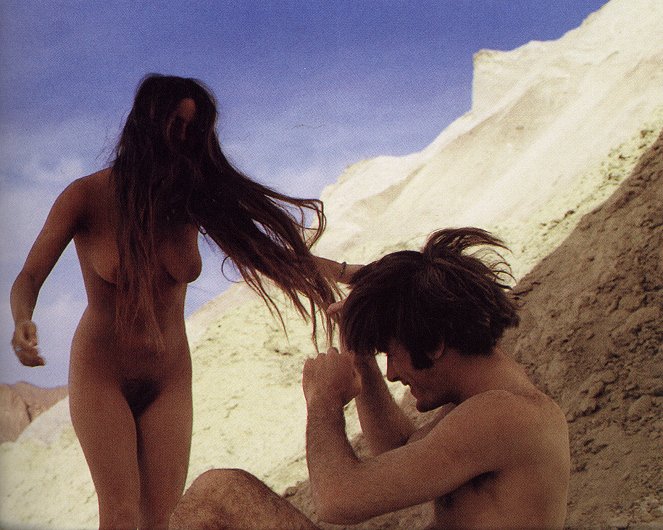Réalisation:
Michelangelo AntonioniPhotographie:
Alfio ContiniActeurs·trices:
Marc Frechette, Daria Halprin, Paul Fix, G. D. Spradlin, Rod Taylor, Harrison Ford, Kathleen Cleaver, Tom Steele, Norman GrabowskiRésumés(1)
A la fin des années 1960, la contestation étudiante prend de plus en plus d’importance aux Etats-Unis. Accusé à tort du meurtre d’un policier durant les émeutes de Los Angeles, Marc fuit dans le désert où il rencontre une jeune femme. (LaCinetek)
Critiques (4)
La résistance et la révolte des jeunes contre la société et le système, entravées par des conventions dépassées et un ordre social symbolisant les entraves à la justice et à la liberté. Les deux personnages principaux incarnent à la fois l'amertume et la force de tout ce mouvement, qui est né à l'Ouest et en particulier aux États-Unis à la fin des années 60. Mark, un jeune homme idéaliste mais énergique, est déterminé et capable de faire le nécessaire pour provoquer le changement (même si cela peut sembler naïf). Daria, une jeune fille, ressent instinctivement la même répulsion envers l'état de la société, mais cherche plutôt un soulagement dans l'évasion (par la méditation, la musique, les rêves). Leurs chemins se croisent brièvement, et tous deux en profitent pleinement en tant que jeunes et beaux hippies de l'époque.... Mais ensuite, un tournant doit se produire, tout comme un tournant a dû se produire dans l'histoire de tout ce mouvement. Celui qui choisit d'agir activement contre le système doit être inexorablement détruit par les circonstances générales. Celle qui choisit d'"aller de l'avant" incarne tous ceux qui, seuls ou sous pression extérieure, ont grandi ou ont été contraints d'abandonner leur "enchantement hippie" simpliste. La destruction de la vieille société et de son système est donc restée à jamais dans leurs rêves. (P.S. - dans le meilleur des cas, dans le pire, ils sont devenus paradoxalement ce qu'on appelle les "yuppies", c'est-à-dire de jeunes membres ambitieux et orientés vers la consommation de la classe supérieure, qui se sont totalement identifiés aux principaux traits sociaux contre lesquels ils ont lutté dans leur jeunesse.)
()
During the introduction, the director introduces us to a community of excited university students engaged in discussions. The university occupation strike demands active involvement and new ideas. "We will create an impassable barricade with cars," someone suggests. "And we could start with your sports car," is the response, accompanied by hearty laughter. No, university students are too intelligent despite their revolutionary fervor to destroy their own automobiles. After all, there are plenty of foreign cars on the street. It would be unfair to compare today's spoiled leftists from prominent families and an academic environment dominated by political correctness with those who fought against real racism and injustice in the 60s. Antonioni was not a politically oriented filmmaker and Zabriskie Point is an atypical deviation in his work. Engaged directors like Pasolini would certainly attempt a political commentary and most likely would have filmed this material much worse. But still, Antonioni demonstrates too much fascination with the revolutionary sentiments among students, and a small time gap from 1968, which shook the Western establishment, is clearly evident. The director allows his protagonist to pilot an airplane, which is still a hobby reserved for the upper middle-class today; in the 60s, it was exclusively a privilege of the rich. Making love in the desert on a geological foundation that Antonioni attributed to his protagonists would indeed amount to a cruel act. Certainly, it was intended as a symbol of freedom, but couldn't there be a more sensible idea? The final scene of settling scores with capitalism through a series of explosions in luxury mansions can now be seen as an ironic reminder of the reversal of social roles and political preferences. Today, different patterns and alliances apply. The poor vote for conservatives and you can find countless progressive billionaires. Antonioni (and not only he) would be amazed by today's uprising of the poor against left-wing meritocracy. Zabriskie Point is interesting today not for any message or capturing of the mood of the time, but for its excellent camera work, music, and overall cinematic language. Overall impression: 55%.
()
More than forty years ago, the legendary director Michelangelo Antonioni noticed that contemporary society is consumed by consumerism. What would it be like if an individual broke away from consumer society? Not in the sense of becoming a rebel or going somewhere to demonstrate for a better future for the Earth. No, what if they chose a path where they simply did whatever they wanted, but without hurting anyone. Okay, maybe they would steal an airplane, but not to steal, but to fly. The film has three crucial moments - at least in my opinion. The first one is the scene in prison, where Mark wants to bail out his friend, but because he is too eager, he is arrested preventively. A young person at the turn of the 70s, as if he equaled something unnatural that could only harm society. An escape from such treatment seems perfectly understandable. The second moment is the group sex in Zabriskie Point, where young people make love because they simply can. It's a display of their freedom, their lack of restraint. But it's still just an escape. What they want, they can only do in no man's land. The third moment is the finale - an explosion of a house representing the hated consumerism. As if Antonioni were saying that if a person wants to achieve their goal, it can only be done through destruction. Otherwise, change is not possible. Escape remains an escape unless the old order changes. Until that happens, everything will remain the same. But the price of such a decision is high, as in this case. The film brilliantly emphasizes the meticulously selected music. More: http://www.filmovy-denik.cz/2012/08/parmeni-krysy-z-temnot-mi-4-blazniva.html
()


Annonces